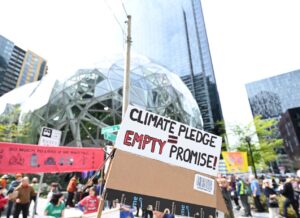Organizations Come Together to Urge Port of Seattle to Transition Away From Toxic Cruise Ships
FOR IMMEDIATE RELEASE: Over two dozen organizations and grassroots groups have sent a letter to Port of Seattle Commissioners and staff outlining the reasons to end our toxic relationship with the cruise ship industry and transition to a cruise-free Salish Sea.
“As one of the fastest-growing sources of climate pollution in the world, corporate cruise ships have no place in the just and livable future we are trying to build. The cruise industry continues a legacy of environmental destruction driven by colonial greed for profit, ultimately wreaking havoc on marginalized human and greater-than-human ecosystems. In acknowledgment and defense of all sacred life, it is our imperative to end extractive relationships with the cruise ship industry and transition to a cruise-free Salish Sea.” – Priya Judge, Coalition Coordinator for Power Past Fracked Gas
“Tourism should not come at the cost of serious health impacts to the communities being visited, or at the expense of irreversible climate damage and the health impacts that result,” says Nick Manning, Climate Program Coordinator at Washington Physicians for Social Responsibility. “We are also concerned about the physical and mental health of onboard workers, many of whom work long hours, seven days a week, for months at a time without workplace protections from abuse or harassment, all while breathing in the toxic smokestack emissions.”
“These massive, polluting ships have no place in the Salish Sea and no place in the circle of life–spewing toxic and climate-damaging emissions in the air while dumping sewage, engine waste, and plastic trash in our sacred waters,” reflects Pamela Bond, Snohomish Tribal Member and founder of Salish Sea Environmental Education and Action. “We should be restoring these waters and doing everything we can to protect our struggling salmon and shellfish and endangered blackfish relatives—and to do that we need to stop poisoning them.”
The letter can be viewed here. Signers include: Seattle Cruise Control, 350 Seattle, Right the Ship Seattle, Snohomish Tribe of Indians, Water Warrior Movement, Protectors of the Salish Sea, Salish Sea Environmental Education and Action, Share the Cities Action Fund, Solutionary Rail, Washington Physicians for Social Responsibility, Center for Biological Diversity, Mosquito Fleet, Transit Riders Union, Power Past Fracked Gas Coalition, STAND.earth, Extinction Rebellion Seattle, Extinction Rebellion Tacoma, 350 Tacoma, Redefine Tacoma, Vashon Climate Action Group, Backbone Campaign, Breach Collective, 350 Everett, 350 Eastside, 350 PDX, 350 Deschutes, 350 Eugene, People for Climate Action Seattle, North Olympic Orca Pod.
BACKGROUND: Seattle Cruise Control was started in 2019 to oppose the expansion of the cruise industry in Seattle, in particular, a third cruise terminal at Terminal 46 near Pioneer Square. While the expansion has been paused indefinitely since the pandemic shut down the 2020 cruise season, Port Commissioners and staff continue to speak positively of cruise tourism as an economic engine — while ignoring the impacts to health, climate, water, and marine life, as well as the exploitation of onboard hospitality workers.
- Cruise ship emissions contain carcinogens, toxins, and particulate matter, harming the health of workers, passengers, coastline communities and destination communities, contributing to heart disease, asthma, cancer and premature death.
- Cruise ships are three times as polluting as airplanes per passenger mile–needing to use between 30-50 gallons of fossil fuels to travel just one mile.
- The Port of Seattle estimates that between 80% to 90% of cruise passengers arrive through Seattle-Tacoma International Airport. In 2019, greenhouse gas emissions for the six-month cruise season and its associated flights totaled between 1.6 and 2.1 million tons — equal to about one-third of the emissions of the entire city of Seattle for the whole year.
- Ship noise impedes the ability of marine mammals to communicate and hunt for food; ships also dump plastic trash, sewage, and fuel oil contaminants directly into the ocean.
- Unlimited cruise ship stopovers at local communities can overwhelm those communities, driving local businesses out, and degrading local infrastructure.
- Cruise ships fly flags of convenience, avoiding taxes and bypassing US labor protections. Onboard hospitality staff often only earn about $2/hour, while working seven days a week, for over 10 hours a day.
- In 2020, as covid outbreaks halted cruise travel, tens of thousands of workers were stuck at sea for months on end, often without pay, after passengers were evacuated — even as cruise executives made bonuses higher than in previous years.








